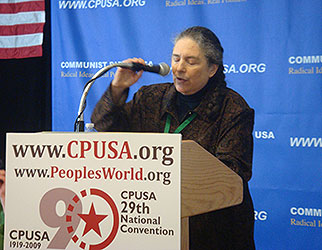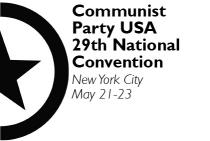
A special report to the 29th National Convention of the Communist Party
The 2010 elections are at the center of the struggle for working class relief from economic crisis, poverty, inequality and environmental devastation. Why? Because this election will either solidify the progressive breakthrough of 2008, or send the country reeling backward.
Barack Obama’s election as president was a victory won by an amazing broad alliance of which we were a part. Our contribution focused on building unity, challenging racism and expanding voter participation.
This was an extraordinary expression of political independence from the extreme right wing. As Sam’s report reminds us, five years ago our major battle was entirely on the defensive under George W. Bush.
The question of how we expand and build on this political independence has been a big part of the pre-convention discussion.
The 2010 mid-term elections represent the next step of our continuing project to decisively defeat the extreme right-wing and expand democratic rights, including ridding the federal government of entrenched corporate interests.
All 435 House seats and a third of senate seats are up for election. A shift of 45 seats in the House and six in the senate would give Republicans the majority. Top battleground states for the Senate are California, Florida, Illinois, Missouri and Ohio.
We are up against a rabid right-wing that refuses to accept the election of the first Black president. Republicans in Congress thought they could bring down the presidency by blocking health care reform.
The Tea Party was birthed by media extremists and racist elements to break up the unity of 2008. They were able to change the debate and peel off some Democratic votes, but they were not able to stop the legislation.
Newt Gingrich is attempting to frame the 2010 elections with a new Contract on America to whip up hysteria that government spending for social needs is against the interests of working people.
This election is about the ability of families and youth to make it through this economic crisis.
In the first place it is about the federal government investing in job creation targeted to the highest poverty areas with training for displaced workers and young people. It is about relief for cities and towns, education and youth programs, housing and health care.
Working people are angry and searching for solutions. Voters’ anger can be turned into collective action for a pro-worker agenda or it can become manipulated by right-wing populism. So far there are examples of both taking place.
Our focus is on building up the strength of the labor movement, racially oppressed, women, youth along with LGBT, environment and peace allies as part of the broad electoral alliance
This goes beyond any one election to the need for organizing a lasting movement and building working class leadership in our country that can reorder priorities and change foreign policy.
A great example is the IAM’s U-Cubed organization of unemployed workers that is pushing for job creation. They got out the vote in Tuesday’s Pennsylvania primary which defeated Sen Arlen Specter in favor of Rep. Joe Systak. The IAM said, “Now it’s our turn to turn the screws with our votes. Together we can put America back to work.”
The election of President Obama opened a door. The challenge to us and the labor and people’s organizations is to walk through that door in the millions with mass struggle for jobs and relief.
The anger of workers was turned into unity against the financial institutions in big mass actions during May Day week. Joint labor – immigrant rights marches and civil disobedience protests against the Arizona law represent the kind of unity that can increase workers’ strength in the elections and improve the balance in Congress.
In Western Pennsylvania, Republicans poured $10 million into capturing the seat that was held by Rep John Murtha, but they did not succeed. Workers responded to the message of their unions. They rejected slanders against Democrat Mark Critz and attacks on House Speaker Nancy Pelosi and President Obama.
A strong challenge to conservative Democrat Arkansas Sen Blanche Lincoln has forced her into a runoff election after she voted against health care reform. This campaign shows it is possible to enlarge the number of Democrats in the Congressional Progressive, Black, Hispanic and Asian Pacific caucuses and change the dynamics against the ultra-right within Congress.
Yet the Tea Party is making in-roads within the Republican primaries, spreading their poison with big money at their disposal.
Richard Trumka’s leadership of the AFL-CIO is providing clarity and maintaining unity by showing how racism hurts all workers and by exposing corporate greed.
Showing that the money is there for jobs and community needs by taxing the rich and corporations, cutting the military budget, and ending the wars is a further contribution to unity.
Helping develop labor’s infrastructure to educate members and bring out the vote is at the center of political independence. This is a training ground for union leaders to run and win election to public office. It is the foundation for a future labor and people’s political party.
The Hill reported on a survey (5/12/10) showing 80% of people see problems with the two party system. A progressive labor and people’s electoral structure like Working America, or Working Families Party must be clear and present or the only visible alternative will be the right-wing.
The Communist Party must also be plainly visible on the issues, utilizing our websites, e-mail, social networking, the downloadable print edition and other materials. Each will strengthen the other. A Pew survey last week showed that half of young people think socialism is better than capitalism.
Turnout will be key in the 2010 elections. This includes registering new voters and reaching out to voters in every area.
On the weekend of June 5, Organizing for America will hold kickoff canvasses across the country to visit the15 million first time voters who took part in the 2008 elections.
Elections are won and lost in precincts, wards, election districts. Every need at the local level depends on the results of the 2010 election.
We should take a look and see in what congressional districts with key races we can bring our publications, establish a new club, or build up an existing one and participate with labor and other community groups.
In a close election a few votes can make the difference. A lasting organization can make an even bigger difference. This approach can also open the door to more Communists running for public office on whatever ticket as part of grass roots coalitions.
Rick Nagin’s campaign in Cleveland last summer and the Chicago campaign at the beginning of this year were an early start to the 2010 elections. These campaigns were also walking through the door opened by the Obama election victory, projecting a people before profits approach to local issues.
This month, after a number of strong grass roots campaigns, Raz Baraka was elected as Councilman in Newark’s central ward. As a teacher and a trade unionist, he is a well-known fighter for the people who comes from a family with deep roots in the city. Newark is a majority Black city undergoing a deep economic crisis. With City Councilor Baraka the fight for real working class solutions and voter participation will be strengthened.
We should revisit the initiative from our last convention and create a network of Communist and left elected officials to share problems, experiences and play a role in bringing the grass roots to the fore. Let’s leave here at full speed for the 24 weeks between now and Election Day November 2, 2010.



 Join Now
Join Now